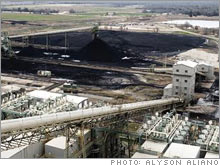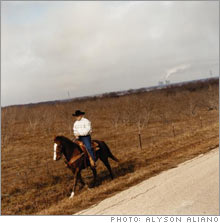TXU faces a Texas coal rushEnergy company TXU plans to build 11 new plants powered by coal. They will generate electricity and greenhouse gases. They are already generating political heat, says Fortune's Marc Gunther.(Fortune Magazine) -- For whatever reason - the wreckage of Hurricane Katrina, Al Gore's "An Inconvenient Truth," the plight of polar bears in the Arctic, the Democratic takeover of Congress - this is the moment when corporate America has at long last decided to get serious about global warming. Joining hands with environmentalists, the CEOs of ten Fortune 500 companies, among them GE (Charts), Alcoa (Charts), DuPont, and utilities Duke Energy and PG&E (Charts), last month called on the government to regulate the greenhouse gases caused by burning fossil fuels. Dozens of big companies, including Wal-Mart (Charts), have pledged to reduce their own emissions of carbon dioxide. In a twist on the theme, Dell (Charts) will arrange to have trees planted for customers who pay $2 to offset the CO2 generated when a computer is plugged into the power grid.
And then there is TXU (Charts). A $10.4-billion-a-year energy company based in Dallas, TXU is staking its future on coal - the dirtiest of all fuels used to generate electricity. Last spring the company announced plans to build 11 new coal-fired power plants in Texas at a cost of nearly $1 billion apiece. That has set off a firestorm of opposition - lawsuits, pickets, petitions, anti-TXU Web sites, lobbying at the state capitol, even a hunger strike. One environmental group calculated that the new plants would generate 78 million tons of CO2 each year - more than the emissions of Sweden, Denmark, or Portugal. Texas already ranks first in the U.S. in carbon emissions. "This is an $11 billion step in the wrong direction," fumes David Hawkins, a climate-change expert at the Natural Resources Defense Council. "And when you're marching backward with $11 billion, you can do a lot of damage." But TXU is just getting started. The company says it will soon unveil plans to build another eight to 15 coal-burning plants outside Texas, counting on economies of scale to hold costs down. TXU also operates strip mines, which supply 70 percent of the coal it burns. To explore the logic behind TXU's plans, I went to see Mike McCall, the company executive in charge of selling the coal plants to Texans. A burly, easygoing 49-year-old, McCall is a coal man to his core. He went to the college at the Missouri School of Mines with the financial help of Peabody Coal, the nation's largest producer, worked in coal mines in Illinois, ran a private railroad that shipped coal, and climbed the ladder at TXU to become head of its wholesale electricity unit. McCall's argument on behalf of coal is straightforward. Coal is abundant, and it is mined in the U.S. It's cheaper than natural gas and more reliable than wind or solar power. TXU would like to generate more nuclear energy - it plans to apply for permits to build up to three nukes in 2008 - but getting a green light from industry-friendly Texas regulators for coal plants, even with all the brouhaha, is a lot easier than obtaining the federal government's approval to build a nuclear power plant. No new permits for nukes have been issued since the 1970s. That leaves coal as the best fuel available to satisfy America's ever-expanding appetite for electricity - all our computers and big-screen TVs and air-conditioned homes and offices need juice. Currently, coal supplies about 52 percent of the nation's electricity, and U.S. demand for electric power is projected to grow by about 1.5 percent a year. (Nationally, more than 150 new coal plants are planned.) With its hot summers, fast-growing population, and expanding industrial base, Texas has an even more urgent need for power; peak demand could exceed supply as soon as the summer of 2008. "If you care about national security and you care about energy independence," McCall says, "you want to find a way to use coal that's acceptable to the public." As for climate change, he allows that it's an "important and long-term issue" and says TXU's plants will be designed so that someday they can be retrofitted to capture and store carbon. Right now, there's no way to capture carbon from coal-burning plants. But, McCall says, "we have confidence that technology will come along." That, say TXU's critics, is hokum. A long list of opponents TXU is fighting not just the usual activists from the Sierra Club and Public Citizen but environmental groups like Environmental Defense and the Natural Resources Defense Council, which are ordinarily business-friendly. (With GE, DuPont, and others, they formed the coalition of big companies to lobby for carbon caps.) Opposing the plants, too, are the Democratic mayors of Dallas and Houston, Texas celebrities such as rocker Don Henley, and prominent businesspeople, including real estate scion Trammell S. Crow and Garrett Boone, the chairman of the Container Store. Albert J. Huddleston, a pro-business Republican who helped finance the Swift Boat television ads against John Kerry in 2004, is funding a lawsuit against TXU because he's concerned about mercury contamination of lakes and fish. So intense is the fervor that a 50-year-old activist, Karen Hadden, went on a ten-day hunger strike last fall to call attention to the issue. "It is certainly an uphill battle," Hadden says, "but we're trying to keep the pressure on every front." Opponents have sued Texas regulators as well as TXU. They are asking the Texas legislature to impose a moratorium on new coal plants. They have taken their case to Wall Street, where Merrill Lynch, Morgan Stanley and Citigroup, the lead underwriters for the plants, have come under fire. They are telling the TXU story in Washington as Congress moves closer to setting mandatory caps on greenhouse-gas emissions. "TXU is becoming the poster child for why we need mandatory federal legislation," says Jim Marston, who runs Environmental Defense's Texas operations. |
Sponsors
|



